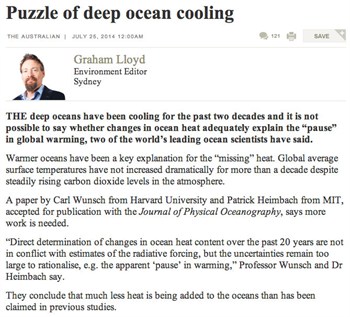 An article in Friday’s The Australian suggested brand new research by two eminent oceanographers casts doubt on scientific understanding of global warming. But the authors of the research have taken the newspaper to task for its coverage of their work.
An article in Friday’s The Australian suggested brand new research by two eminent oceanographers casts doubt on scientific understanding of global warming. But the authors of the research have taken the newspaper to task for its coverage of their work.
The research by Carl Wunsch from Harvard University and Patrick Heimbach from MIT found temperatures seem to be falling in parts of the very deep ocean, known as ‘the abyss’.
In a piece headline headlined “Puzzle of deep ocean cooling”, journalist Graham Lloyd of the Australian interpreted the new research for readers:
“The deep oceans have been cooling for the past two decades and [so] it is not possible to say whether changes in ocean heat adequately explain the “pause” in global warming”.
But the authors think Lloyd’s article is misleading. In an letter to the editor in today’s edition of the Australian, they say:
“The article by Graham Lloyd will likely leave a mis-impression with many of your readers concerning the substance of our paper.”
Wunsch tells us Lloyd’s article “cherrypicks” statements from their paper and “misses some key points”.

Overall, the oceans are warming
The new research, just published in the Journal of Physical Oceanography, explains how measurements in recent decades suggest some parts of the very deep ocean – the ‘abyss’ – are cooling slightly. The paper says:
“[Our findings show] warming in the abyss at high southern latitudes, in the western basin of the Atlantic and with cooling elsewhere.”
At depths of thousands of meters, taking the temperature of the deep ocean is very challenging. Quite a lot of the discussion in the paper is about the limits of current measurements.
Though the research suggests some parts of the very deep ocean are cooling, not all of it is. Scientists can detect a weak cooling signal overall, but other parts are showing strong warming.
This wasn’t explained by The Australian, say the authors. Wunsch tell us:
“If the opening sentence in the Australian had said ‘Parts of the deep ocean have been cooling for the past two decades’ there would have been no quarrel with that statement.”
Wunsch and Heimbach’s research is very clear on an important point – that overall, the planet’s oceans are warming. The letter to the editor says:
“We never assert that global warming and warming of the oceans are not occurring – we do find an ocean warming, particularly in the upper regions.”
The point the new paper makes is the oceans aren’t a solid lump. Knowing how different parts of the oceans behave is important. Though new technology is making it easier, the deepest and most remote parts of the ocean are still poorly understood. Wunsch tells us:
“[The oceans are] a very noisy system, with parts warming and parts cooling, it looks like a net warming is taking place, but exactly by how much is at the very edge of the science.”
Not a reason to doubt scientists explanations of the “pause”
Lloyd argues that parts of the deep ocean cooling contradicts other scientists’ explanations of the so-called “pause” in surface warming.
The “pause” describes the fact that temperatures at earth’s surface have risen more slowly in the last 15 years than in previous decades, despite greenhouse gas emissions continuing to rise.
Scientists say periods of slower and faster warming aren’t unusual and the most likely explanation is that heat is making its way to the deep ocean rather than staying at the surface.
The Australian gives the impression Wunsch and Heimbach disagree with this explanation. It says their study suggests “much less heat is being added to the oceans than has been claimed in previous studies”.
But that’s not the case, say the authors. Wunsch tells us the overall warming of the ocean they report is consistent with other scientific literature – a point they also make in the paper.
An article by Christopher Booker in Saturday’s Telegraph also argues the new research contradicts other scientists.
US climate professor Kevin Trenberth first described the slower-than-expected surface warming as the “missing heat” problem, and has been prominent in research pointing to faster warming in the deep ocean as a likely explanation.
Describing Trenberth as “one of the UN’s top climate alarmists”, Booker claims Wunsch’s new paper suggests “the warmists have no real evidence to support their claim other than computer modelling”. He says:
“Now magisterial cold water has been poured on this theory by none other than Prof Carl Wunsch, probably the world’s most respected oceanographer.”
But Wunsch’s letter to the editor makes clear his findings are of little consequence for global warming or the so-called “pause”. The letter says:
“Contrary to the implications of Lloyd’s article, parts of the deep ocean are warming, parts are cooling, and although the global abyssal average is negative, the value is tiny in a global warming context.”
A quote from Dr Andy Hogg of Australia’s National University at the end of the Australian article explains parts of the very deep ocean can take a very long time (centuries to millennia) to respond to what’s happening at the surface.
Hogg adds:
“So if cooling has occurred over large parts of the abyssal ocean, it is unrelated to global warming of the atmosphere over the last century.”
Hogg adds that while there is still some uncertainty about temperatures in the deep ocean, shallower regions are well understood and Wunsch’s findings are “consistent” with warming oceans.
Wunsch told us he thought Hogg’s comments were “on the mark,” and that it was a shame that they are “hidden at the end” of the article.
Source: Carbon Brief. Reproduced with permission.







